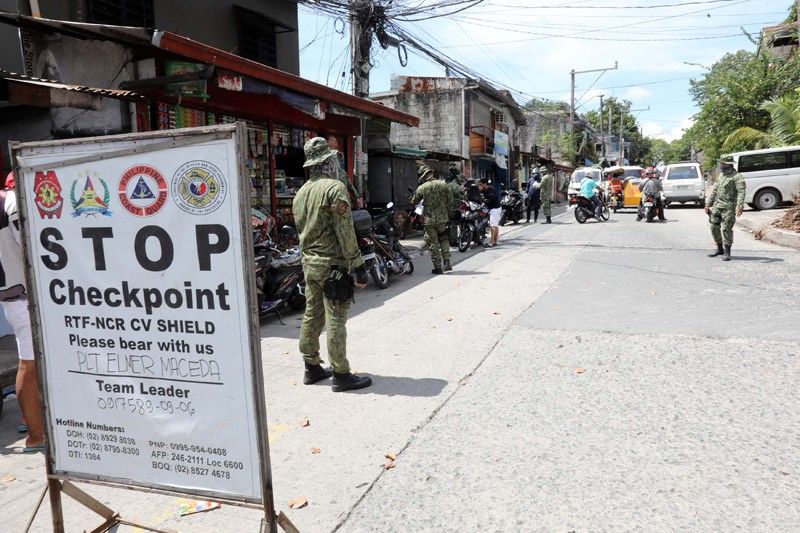New Metro Manila quarantine status out this week

MANILA, Philippines — President Duterte is expected to announce this week the updated quarantine classifications of Metro Manila and other areas as the government continues to reopen the economy while preventing the further spread of the coronavirus disease 2019 or COVID-19.
The Inter-Agency Task Force for the Management of Emerging Infectious Diseases (IATF) is expected to meet today to come up with a final recommendation to the President on the lockdown scenarios.
The existing classifications, which took on Sept. 1, will lapse at the end of the month.
There is no certainty that Duterte will disclose the new quarantine groupings today.
“Maybe not yet,” presidential spokesman Harry Roque said in a text message in Filipino when asked if Duterte would announce his decision on the quarantine today.
IATF vice chairman and Cabinet Secretary Karlo Nograles said the government’s pandemic task force already has preliminary findings on the COVID-19 situation in various areas.
“We share the preliminary findings to the different (local government units)... and they have the opportunity to make an appeal if they want to... We will then look at the appeals, if there are any, and we will come up with a final recommendation to the President,” Nograles said in a live online session last Saturday.
“The President, ultimately, will decide on the community quarantine of the different provinces and (the National Capital Region),” he added.
Metro Manila areas are facing different situations, but noted that the mayors of the capital region prefer to have a single classification, according to the Cabinet official.
“Technically speaking, some of the cities may appeal for lower classification, those whose numbers are improving. But I do not want to pre-empt the announcement,” he said.
Nograles added that Metro Manila mayors were expected to meet last night to arrive at a consensus on the region’s quarantine scenario.
Metro Manila, which contributes more than a third of the Philippines’ economic output, was placed under the lenient general community quarantine (GCQ) last Sept. 1.
Most areas in the country are now under the most lenient modified GCQ, where practically all industries can partially resume operations.
Last Friday, Interior Secretary Eduardo Año said the majority of the Metro Manila mayors wants to remain under GCQ to ensure the safety of their constituents.
Officials had previously said the decision on whether to ease quarantine restrictions depends on various factors, including the number of COVID-19 cases and the area’s critical health care capacity.
‘Based on data’
Meanwhile, Vice President Leni Robredo yesterday urged the government to base on data its decision whether or not to further relax the quarantine measures in Metro Manila.
“For me, I hope the decision will be based on data, not on the decision of the mayor or any agency because this will only lead to disagreements,” Robredo said in her weekly program over radio station dzXL.
Business groups have backed calls to further ease quarantine restrictions to MGCQ in Metro Manila next month.
The University of the Philippines OCTA Research team, however, said the GCQ status in the capital region must remain to sustain the gains made in the past month.
Robredo noted that around 80,000 confirmed cases of COVID-19 have been recorded so far this month.
“Although the situation is better compared (with that in) August, this figure is still high,” she said.
The Vice President urged the IATF to come up with a system of classifications based on the number of cases.
“If this is the number, this is the corresponding level. In our country, it’s as if the numbers are being set aside,” Robredo said.
“The IATF can decide on the threshold level. What is the threshold level under this classification. For example, it could be implemented not in the entire Metro Manila, but in areas where there are high transmission rates,” she added.
Robredo likewise called for more “strategic” testing, where more swab tests would be conducted in areas with “severe” transmission of infection.
Improved social, health care response
Progressive group Bagong Alyansang Makabayan (Bayan) yesterday called on the government to improve its health and social response to the COVID-19 pandemic amid the impending extension of the community lockdown in Metro Manila and other parts of the country.
“It was the working people who bore the brunt of effects of the lockdown. They were the ones who made the big sacrifice to slow down the spread of the virus, amid problems with testing, validation and the overall lack of capacity of the health system,” Bayan secretary general Renato Reyes said.
Bayan issued the statement amid the anticipation that the GCQ in Metro Manila, set to lapse on Sept. 30, will be extended as recommended by Metro Manila mayors to the IATF.
Reyes pointed out that extending the community quarantine is useless if the health care system and social response will not be improved.
“The government wants to prolong the quarantine, but does not want to spend more for social amelioration. The government wants to prolong the lockdown, but its strategy is to wait for a vaccine from China,” he said.
“The government wants to prolong the lockdown but it has made health only the fifth in terms of appropriations in the 2021 budget,” he added.
Reyes noted that the P203-billion proposed budget for the Department of Health (DOH) for 2021 was too small, especially as P71 billion of the amount would be allocated to the Philippine Health Insurance Corp. (PhilHealth).
“This is untenable since we are in a pandemic... As it stands now, the (Department of Public Works and Highways, Department of National Defense and Department of the Interior and Local Government) have bigger budgets compared with the DOH and (Department of Social Welfare and Development),” he said.
“A crucial part in the fight against COVID-19 and ending the lockdown is increasing the capacity of our health care system – more hospitals and health workers, increased testing and faster validation,” he added. – Helen Flores, Elizabeth Marcelo
- Latest
- Trending




























